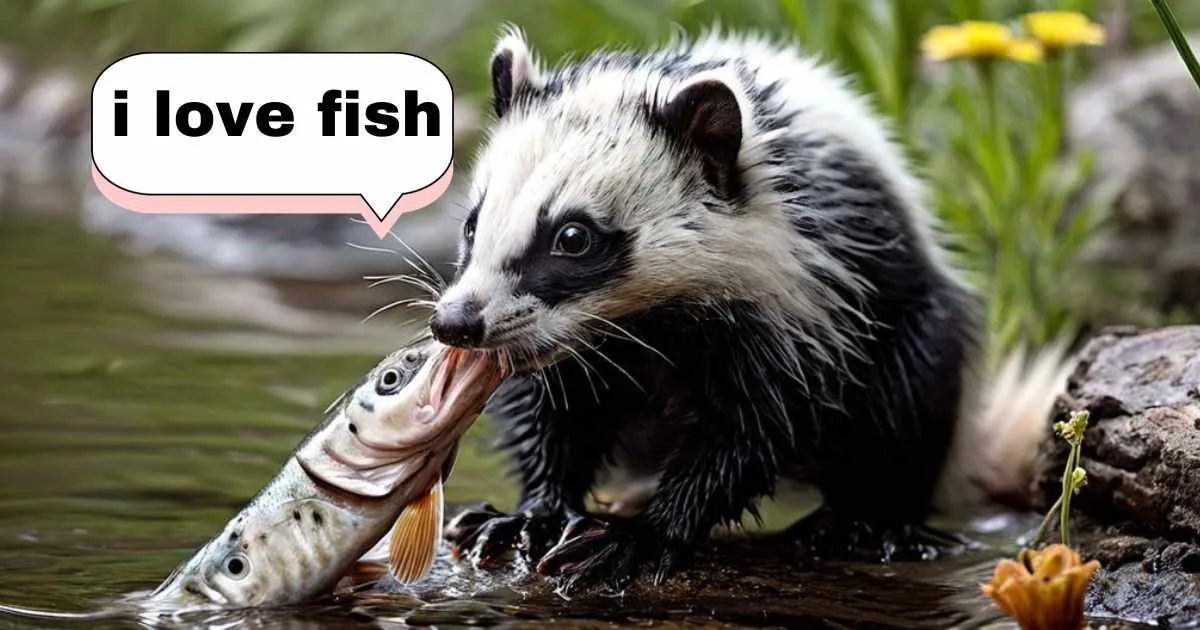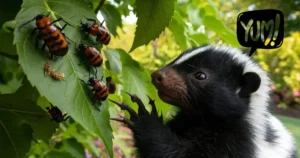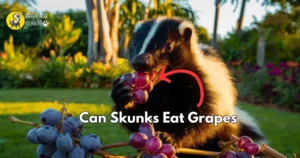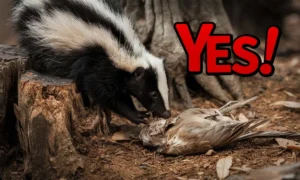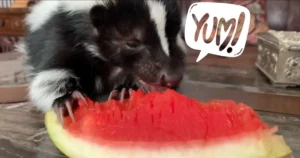Can Skunk Eat Fish?
Skunks are renowned for their distinct black-and-white fur and infamous defensive spray, but their diet reveals even more about these fascinating creatures. While they are primarily land-based omnivores, fish can occasionally find its way into their diverse menu. Let’s explore whether skunks eat fish, their scavenging tendencies, and how their diet supports their adaptability and survival.
What Do Skunks Typically Eat?
Skunks are opportunistic feeders, meaning they eat whatever is available. Their diet includes a variety of plant and animal matter, which shifts with the seasons.
Primary Food Sources
- Insects: Beetles, crickets, grubs, and larvae are skunk staples.
- Small Mammals: Mice, voles, and other rodents provide essential protein.
- Fruits and Berries: A common food source during summer and fall.
- Bird Eggs: Often raided from nests.
- Amphibians and Reptiles: Frogs, lizards, and snakes.
- Carrion: Dead animals, including leftover fish, are scavenged.
Skunks’ omnivorous nature allows them to adapt to various environments, from forests to urban areas.
Do Skunks Eat Fish?
Yes, skunks do eat fish, though it is not a common or primary food source. They are opportunistic eaters and will consume fish if the opportunity arises, such as scavenging from ponds or streams.
When Do Skunks Eat Fish?
- Scavenging: Skunks often consume dead or discarded fish near water bodies or fishing spots.
- Easy Catch: Slow-moving fish in shallow waters may occasionally be caught by skunks.
- Aquatic Foraging: In areas with abundant aquatic life, skunks may explore ponds and streams for food like crayfish, frogs, and sometimes fish.
Fish provides skunks with valuable proteins and fats, making it a beneficial yet occasional addition to their diet.
How Do Skunks Obtain Fish?
Despite being land mammals, skunks are capable swimmers and will wade into shallow water if necessary. However, their fish consumption is usually opportunistic rather than deliberate hunting.
Methods Skunks Use to Eat Fish
Raiding Ponds: Skunks have been known to visit backyard fish ponds, where they might target slower-moving species like koi or goldfish.ed relationship between skunks and water as we dive into their foraging and swimming behaviors.
Scavenging: Skunks rely on their keen sense of smell to locate fish remains left by predators or humans.
Fishing: Although rare, skunks may attempt to catch small fish in shallow waters.
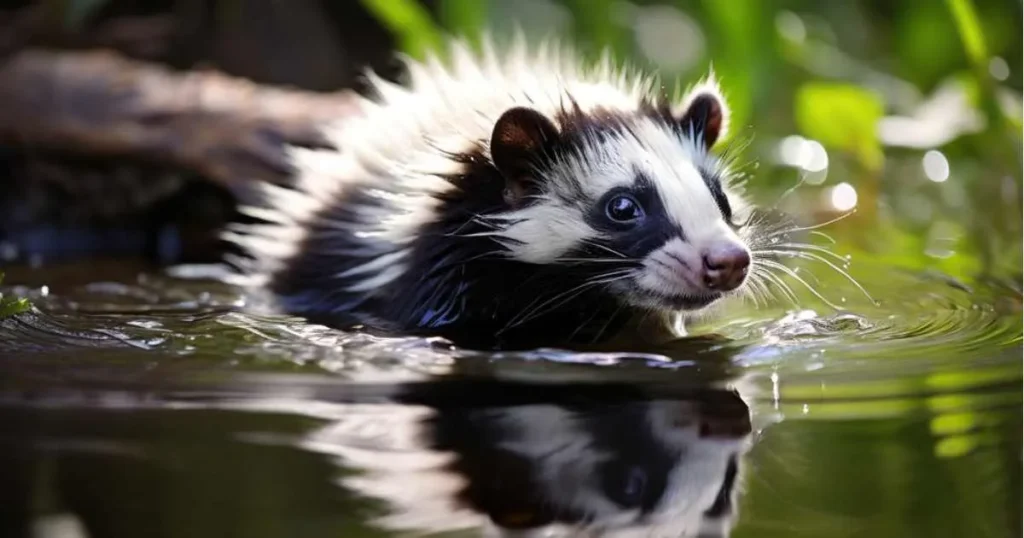
The Role of Fish in a Skunk’s Diet
While not a staple, fish offers nutritional benefits for skunks, especially during times when other food sources are scarce.
Nutritional Value of Fish for Skunks
- Proteins: Essential for muscle growth and repair.
- Fats: Provide energy and help maintain body temperature.
- Vitamins and Minerals: Support overall health and immune function.
The addition of fish to a skunk’s diet highlights their ability to adapt and survive in different environments.
Skunks and Aquatic Foraging
Skunks occasionally interact with aquatic habitats such as ponds, rivers, and lakes. While their primary focus in these areas is often frogs or crayfish, fish can sometimes become part of their aquatic forage.
Skunks in Aquatic Environments
Diet Diversification: Access to aquatic food sources allows skunks to expand their menu, especially during warmer months.
Swimming Abilities: Skunks are surprisingly good swimmers and can paddle through water to reach food.
Water Sources: They frequent ponds and streams, often finding aquatic insects, amphibians, and fish.
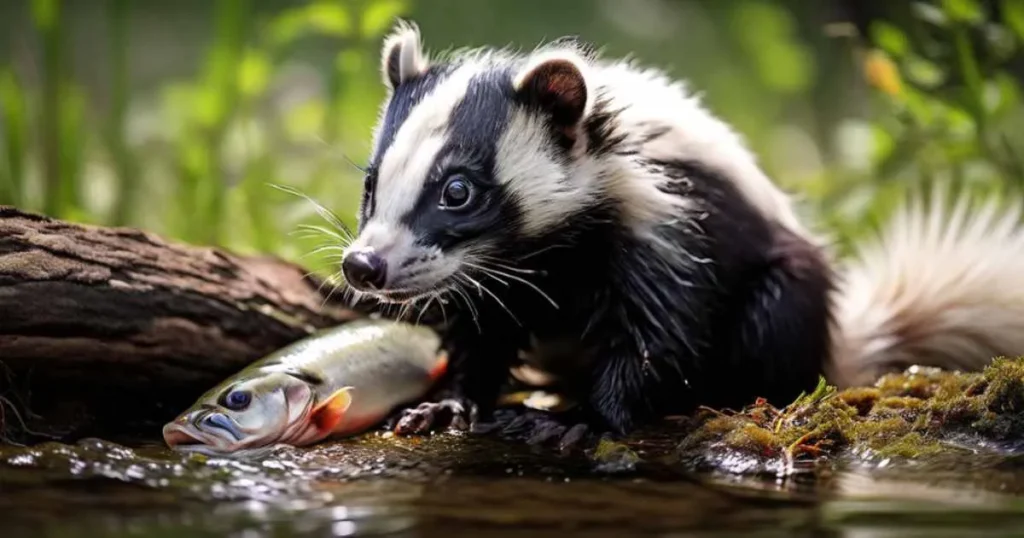
Do Skunks Steal Fish From Humans?
Skunks are resourceful scavengers and may venture into human habitats in search of food. Fish in backyard ponds or leftover bait from fishing trips can attract these curious foragers.
How to Prevent Skunks From Eating Fish in Your Pond
- Install Netting: Protect fish ponds with durable netting to deter skunks.
- Secure Waste: Dispose of fish scraps or bait properly to avoid attracting skunks.
- Motion-Activated Sprinklers: Startle skunks away from water features.
- Fence Off Ponds: Use fencing to restrict access to aquatic areas.
The Importance of Skunks in Ecosystems
Skunks play a vital role in maintaining ecological balance. Their diverse diet helps control pest populations and supports nutrient recycling.
Key Contributions
- Pest Control: Skunks reduce insect and rodent populations, benefiting gardens and farms.
- Scavengers: By consuming carrion, including dead fish, skunks help keep ecosystems clean.
- Seed Dispersal: Eating fruits and berries aids in plant propagation.
Understanding skunks’ dietary habits, including their occasional consumption of fish, underscores their importance in maintaining healthy ecosystems.
Frequently Asked Questions
Do Skunks Like Fish?
Skunks do not actively seek fish but will eat it if available, particularly when scavenging near water bodies or human habitats.
Can Skunks Eat Raw Fish?
Yes, skunks can eat raw fish. Their digestive systems are equipped to handle a variety of raw foods, including carrion.
What Are Skunks’ Favorite Foods?
Skunks favor protein-rich foods like insects and small mammals but also enjoy fruits, berries, and nuts. Fish is a rare treat rather than a favorite.
Conclusion
While fish is not a primary food source for skunks, their opportunistic nature allows them to include it in their diet when available. By understanding skunks’ feeding habits, we gain insight into their role in ecosystems and learn how to manage their interactions with human environments. Whether they’re scavenging fish remains or foraging in your backyard pond, these adaptable creatures continue to surprise and fascinate.

